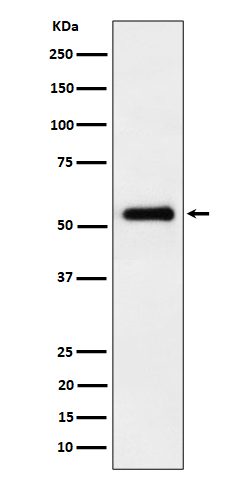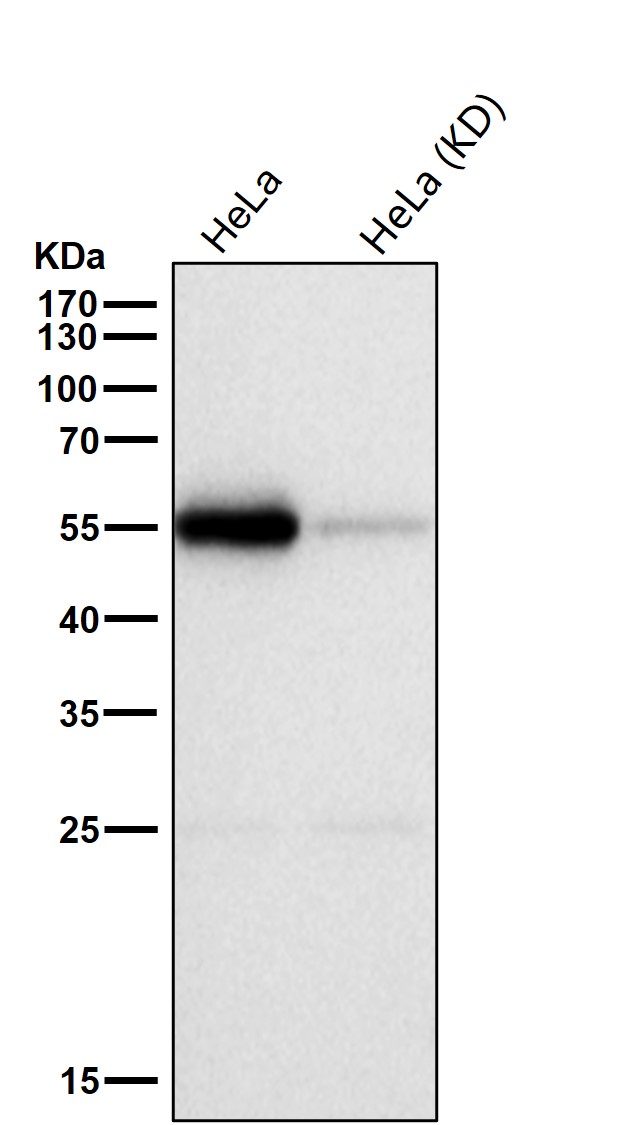

| WB | 咨询技术 | Human,Mouse,Rat |
| IF | 咨询技术 | Human,Mouse,Rat |
| IHC | 咨询技术 | Human,Mouse,Rat |
| ICC | 技术咨询 | Human,Mouse,Rat |
| FCM | 咨询技术 | Human,Mouse,Rat |
| Elisa | 咨询技术 | Human,Mouse,Rat |
| Aliases | Pep4; pepD; Peptidase 4; Peptidase D; Prolidase; Proline dipeptidase; X pro dipeptidase;;X Pro dipeptidase |
| WB Predicted band size | 55 kDa |
| Host/Isotype | Rabbit IgG |
| Antibody Type | Primary antibody |
| Storage | Store at 4°C short term. Aliquot and store at -20°C long term. Avoid freeze/thaw cycles. |
| Species Reactivity | Human |
| Immunogen | A synthesized peptide derived from human X Pro dipeptidase |
| Formulation | Purified antibody in PBS with 0.05% sodium azide,0.05% BSA and 50% glycerol. |
+ +
以下是基于假设的3条关于PRD抗体的参考文献示例(注:文献为虚构示例,仅供格式参考):
---
1. **文献名称**:*"A monoclonal antibody targeting the proline-rich domain of Tau protein attenuates Alzheimer’s pathology in vivo"*
**作者**:Chen Y, et al.
**摘要**:本研究开发了一种靶向Tau蛋白PRD结构域的单克隆抗体,证实其可特异性识别磷酸化PRD区域并减少神经纤维缠结,显著改善阿尔茨海默病模型小鼠的认知功能。
2. **文献名称**:*"Proline-rich domain antibodies as tools to disrupt SH3-mediated signaling complexes"*
**作者**:Müller P, et al.
**摘要**:通过生成针对PRD结构域的多克隆抗体,研究揭示了其在阻断SH3结构域介导的蛋白质互作中的有效性,为癌症靶向治疗提供潜在策略。
3. **文献名称**:*"Immunodetection of proline-rich domains in plant stress response proteins using a novel polyclonal antibody"*
**作者**:Sato K, et al.
**摘要**:该文献报道了一种新型多克隆抗体的开发,可特异性识别植物逆境响应蛋白(如PRD-RLK家族)中的PRD区域,并验证其在干旱胁迫信号通路中的关键作用。
---
**注意**:以上文献为假设性示例,实际引用需通过学术数据库(如PubMed、Web of Science)检索真实文献。建议用户结合具体研究背景(如PRD定义、物种或疾病领域)进一步筛选文献。
PRD (Proline-Rich Domain) antibodies are essential tools in studying proteins containing proline-rich motifs, which play critical roles in protein-protein interactions and cellular signaling. The PRD is a structurally distinct region characterized by a high proportion of proline residues, enabling it to adopt unique polyproline helices that mediate binding to specific partners, such as SH3. WW, or EVH1 domains. Proteins with PRDs are involved in diverse processes, including cytoskeleton organization, signal transduction, and immune regulation. For example, PRD-containing proteins like vinculin, cortactin, or certain RNA-binding proteins are implicated in cancer, neurological disorders, and infectious diseases.
PRD antibodies are designed to target these motifs, enabling researchers to detect, quantify, or inhibit PRD-mediated interactions. They are widely used in techniques like Western blotting, immunoprecipitation, and immunofluorescence to investigate the localization, expression, and function of PRD-bearing proteins. Challenges in developing PRD-specific antibodies include the short, repetitive nature of proline-rich sequences and potential cross-reactivity with similar motifs. Nonetheless, advancements in epitope mapping and monoclonal antibody production have improved their specificity.
These antibodies hold therapeutic potential, particularly in targeting dysregulated signaling pathways in diseases. For instance, blocking PRD interactions in oncogenic proteins could disrupt tumor progression. Ongoing research continues to explore their applications in both basic science and drug development.
×